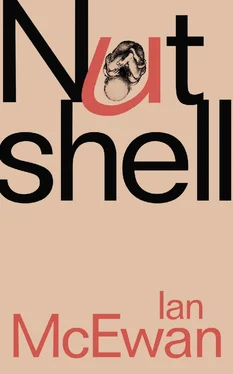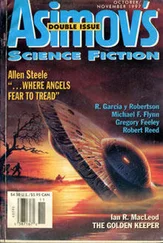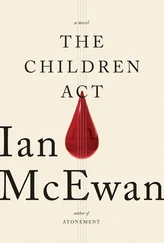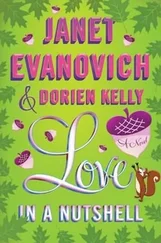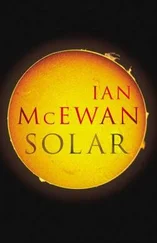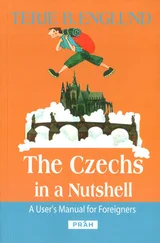‘I could go up and help him,’ Claude says at last. ‘You know, many hands make—’
‘OK, OK. Wait.’ My mother can’t bear to hear the rest. She and I have much in common.
We hear the front door close, and seconds later those same shoes — old-style leather soles — making the sound on the stairs they made last night when he came down with his lover and settled his fate. He whistles tunelessly as he comes, more Schoenberg than Schubert, a projection of ease rather than the thing itself. Nervous then, despite the lordly speech. No easy matter, to evict your brother and the woman you hate who bears your child from the house you love. He’s nearer now. Again, my ear is stuck to the gluey wall. There’s no inflection or pause or swallowed word I’d care to miss.
My informal family dispenses with greetings.
‘I was hoping to see your suitcase by the door.’ He says it humorously and, as usual, ignores his brother.
‘Not a chance,’ my mother smoothly says. ‘Sit down and have a coffee.’
He sits. A pouring sound, a teaspoon clinks.
Then my father. ‘A contractor’s coming to remove the appalling mess that’s in the hall.’
‘It’s not a mess. It’s a statement.’
‘Of what?’
‘Protest.’
‘Oh yes?’
‘At your neglect.’
‘Hah!’
‘Of me. And our baby.’
This could be in the noble cause of realism, of the plausible. An oily welcome might raise his guard. And recalling him to his paternal duty — brava!
‘They’ll be here at twelve. Pest control are coming too. They’ll be fumigating the place.’
‘Not while we’re here they won’t.’
‘That’s up to you. They start at midday.’
‘They’ll have to wait a month or two.’
‘I’ve paid them double to ignore you. And they have a key.’
‘Oh,’ says Trudy, with an appearance of true regret. ‘I’m sorry you’ve wasted so much money. A poet’s money at that.’
Claude leaps in, too soon for Trudy. ‘I’ve made this delicious—’
‘Dearest, everyone needs more coffee.’
The man who obliterates my mother between the sheets obeys like a dog. Sex, I begin to understand, is its own mountain kingdom, secret and intact. In the valley below we know only rumours.
As Claude stoops over the machine on the far side of the room, my mother says pleasantly to her husband, ‘While we’re on it, I hear your brother was very kind to you. Five thousand pounds! Lucky boy. Did you thank him?’
‘He’ll get it back, if that’s what you mean.’
‘Like the last lot.’
‘He’ll get that too.’
‘I hate to think of you spending it all on fumigators.’
My father laughs in genuine delight. ‘Trudy! I can almost remember why I loved you. By the way, you’re looking beautiful.’
‘A little unkempt,’ she says. ‘But thank you.’ Theatrically, she lowers her voice, as though to exclude Claude. ‘After you left we partied. All night long.’
‘Celebrating your eviction.’
‘You could say that.’
We lean forward, she and I, me feet first, and my impression is that she’s put her hand on his. He’s closer now to the sweet disorder of her braids, the wide green look, the pink-perfect skin perfumed with the scent he bought her long ago in the Dubrovnik duty-free. How she thinks ahead.
‘We had a glass or two and we talked. We decided. You’re right. Time to go our separate ways. Claude’s place is nice and St John’s Wood is a dump compared to Primrose Hill. And I’m so happy about your new friend. Threnody.’
‘Elodie. She’s lovely. We had a terrible fight when we got in last night.’
‘But you looked so happy together.’ I note the lift in my mother’s tone.
‘She’s decided that I’m still in love with you.’
This too has an effect on Trudy. ‘But you said it yourself. We hate each other.’
‘Quite. She thinks I protest too much.’
‘John! Should I phone her? Tell her how much I loathe you?’
His laugh sounds uncertain. ‘Now there’s the path to perdition!’
I’m recalled to my mission: the sacred, imagined duty of the child of separated parents is to unite them. Perdition. A poet’s word. Lost and damned. I’m a fool to let my hopes rise a point or two, like a futures market after a rout and before the next. My parents are merely playing, tickling each other’s parts. Elodie is mistaken. What stands between the married pair is no more than protective irony.
Here’s Claude bearing a tray, something heavy or sulky in his offer.
‘More coffee?’
‘God, no,’ my father says in the simple, dismissive tone he reserves for his brother.
‘We’ve also got some nice—’
‘Darling, I’ll have another cup. A big one. Your bro,’ my mother says to my uncle, ‘is in the doghouse with Threnody.’
‘A threnody,’ my father defines for her with exaggerated care, ‘is a song for the dead.’
‘Like “Candle in the Wind”,’ says Claude, coming to life.
‘For God’s sake.’
‘Anyway,’ Trudy says, retreating some steps back through their exchange. ‘This is the marital home. I’ll move out when I’m ready and it won’t be this week.’
‘Come on. You know the fumigator was just a tease. But you can’t deny it. The place is a shithole.’
‘Press me too hard, John, and I might decide to stay. See you in court.’
‘Point taken. But you won’t mind if we remove the crap in the hall.’
‘I do mind a bit.’ Then, after a moment’s contemplation, she nods her assent.
I hear Claude pick up the plastic bag. His cheeriness wouldn’t convince the dimmest child. ‘If you’ll excuse me. Stuff to do. No rest for the wicked!’
THERE WAS A time when Claude’s exit line might have made me smile. But lately, don’t ask why, I’ve no taste for comedy, no inclination to exercise, even if I had the space, no delight in fire or earth, in words that once revealed a golden world of majestical stars, the beauty of poetic apprehension, the infinite joy of reason. These admirable radio talks and bulletins, the excellent podcasts that moved me, seem at best hot air, at worst a vaporous stench. The brave polity I’m soon to join, the noble congregation of humanity, its customs, gods and angels, its fiery ideas and brilliant ferment, no longer thrill me. A weight bears down heavily on the canopy that wraps my little frame. There’s hardly enough of me to form one small animal, still less to express a man. My disposition is to stillborn sterility, then to dust.
These lowering, high-flown thoughts, which I long to declaim alone somewhere, return to oppress me as Claude disappears up the stairs and my parents sit in silence. We hear the front door open and close. I strain without success for the sound of Claude opening the door of his brother’s car. Trudy leans forward again and John takes her hand. The faintest rise in our blood pressure suggests a squeeze of his psoriatic fingers against her palm. She says his name quietly, with a falling tone of fond reproach. He says nothing, but my best guess is he’s shaking his head, compressing his lips into a thin smile, as if to say, Well, well. Look what’s come of us.
She says warmly, ‘You were right, it’s the end. But we can do this gently.’
‘Yes, it’s best,’ my father agrees in his pleasant, rumbling voice. ‘But Trudy. Just for old times. Shall I say a poem for you?’
Her emphatic, childlike shake of the head gently rocks me on my bearings, but I know as well as she does that, for John Cairncross, in poetry no means yes.
‘Please John, for heaven’s sake don’t.’
But he’s already drawing breath. I’ve heard this one, but it meant less then.
Читать дальше
